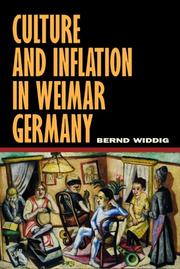Check nearby libraries
Buy this book

"For many Germans the hyperinflation of 1914-1923 was one of the most decisive experiences of the twentieth century. In his original and authoritative study, Bernd Widdig investigates the effects of that inflation on German culture during the Weimar Republic. He argues that inflation, with its dynamics of massification, devaluation, and the rapid circulation of money, is an integral part of modern culture and intensifies and condenses the experience of modernity in a traumatic way.".
"Looking at how inflation was articulated in the German cultural imagination, he finds that the shattering of important values and the feelings of betrayal left permanent scars embedded more deeply than inflation's measurable economic consequences.
Among the themes Widdig explores are the importance of the number zero for understanding the inflationary dynamic; gambling and inflation; the impact of inflation on the rise of anti-Semitism; the significance of work as an alternative space in the inflationary chaos; the erosion of the status of writers, artists, and professors; and the different feminine codings within visual representations of inflation.
The epilogue addresses the "afterlife" of German inflation: the ways it shaped National Socialist ideology and its continuing power in the collective memory of Germany's postwar society.".
"Widdig illuminates the effects of Germany's inflation by drawing on a wide range of canonical literature and films as well as generally unexplored cultural materials such as satirical illustrations, photographs, and pamphlets. Widdig's clear-headed ability to combine cultural analysis with popular social experience makes his book highly readable and a welcome addition to German studies, German cultural history, and discussions of modernity."--BOOK JACKET.
Check nearby libraries
Buy this book

Previews available in: English
Subjects
German literature, History and criticism, Social conditions, Inflation (Finance), Civilization, Economic policy, Money in literature, Antisemitism, History, Inflation (finance), germany, German literature, history and criticism, 20th century, Germany, civilization, Germany, social conditions, Germany, history, 1918-1933, Germany, economic policy, Conditions sociales, Inflation, Histoire, Politique économique, Littérature allemande, Histoire et critique, Civilisation, Antisémitisme, BUSINESS & ECONOMICS, Geschichte, Kultur, Kunst, Weimarer Republik, Wirtschaft| Edition | Availability |
|---|---|
|
1
Culture and Inflation in Weimar Germany (Weimar and Now: German Cultural Criticism)
March 5, 2001, University of California Press
Hardcover
in English
- 1 edition
0520222903 9780520222908
|
aaaa
|
Book Details
First Sentence
"For many American readers the German inflation of the 1920s may trigger much more recent personal recollections of life in the United States during the late 1970s and early 1980s, when a hapless President Jimmy Carter tried to fight the frightening climb of the Consumer Price Index, which had reached more than 13 percent in 1979 (Nocera 176)."
Classifications
The Physical Object
ID Numbers
Source records
amazon.com recordIthaca College Library MARC record
Internet Archive item record
Library of Congress MARC record
Better World Books record
amazon.com record
marc_columbia MARC record
marc_nuls MARC record
Promise Item
Internet Archive item record
Internet Archive item record
marc_columbia MARC record
Community Reviews (0)
Feedback?| July 17, 2024 | Edited by MARC Bot | import existing book |
| January 7, 2023 | Edited by MARC Bot | import existing book |
| July 31, 2020 | Edited by ImportBot | import existing book |
| July 28, 2014 | Edited by ImportBot | import new book |
| December 10, 2009 | Created by WorkBot | add works page |









